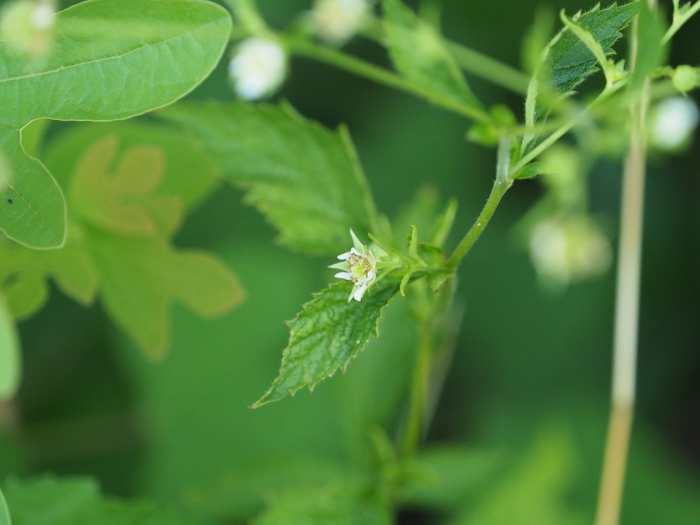White Avens
(Geum canadense)
White Avens (Geum canadense)
/
/

mefisher
Public Domain
Image By:
mefisher
Recorded By:
Copyright:
Public Domain
Copyright Notice:
Photo by: mefisher | License Type: Public Domain | License URL: http://creativecommons.org/publicdomain/zero/1.0/ | Rights Holder: mefisher | Publisher: iNaturalist | Date Created: 2020-07-03T09:51:48-07:00 |














































































Estimated Native Range
Summary
Geum canadense, commonly known as White Avens, is a perennial herb that is deciduous to semi-evergreen, depending on the climate. Native to North American woodland settings, including deciduous forests and forest margins in the Eastern USA and Southeast Canada, it is also found in montane regions of Central Mexico. This species typically grows to a height of 1-2 feet (30-60 cm) and spreads 1 foot (30 cm) wide. White Avens has a basal rosette of compound leaves with toothed leaflets and produces small, white flowers with five petals and contrasting green sepals during its summer blooming period, which lasts one to two months. The flowers are modest in appearance but can add a delicate charm to woodland gardens. After flowering, it forms clusters of long, thin seeds with hooks that facilitate dispersal by animals and humans.
White Avens is valued for its low maintenance and adaptability to a range of light conditions, from light shade to partial sun. It is suitable for naturalistic plantings, woodland gardens, and as a ground cover. While it prefers moist to dry soil conditions, it is adaptable to various soil types with different drainage capabilities. Gardeners should be aware that Geum canadense can self-seed and spread, potentially becoming aggressive in some conditions. It is also potentially invasive outside its native range, so local regulations should be consulted before planting.CC BY-SA 4.0
White Avens is valued for its low maintenance and adaptability to a range of light conditions, from light shade to partial sun. It is suitable for naturalistic plantings, woodland gardens, and as a ground cover. While it prefers moist to dry soil conditions, it is adaptable to various soil types with different drainage capabilities. Gardeners should be aware that Geum canadense can self-seed and spread, potentially becoming aggressive in some conditions. It is also potentially invasive outside its native range, so local regulations should be consulted before planting.CC BY-SA 4.0
Plant Description
- Plant Type: Herb
- Height: 2-4 feet
- Width: 0.5-1 feet
- Growth Rate: Moderate
- Flower Color: White
- Flowering Season: Spring
- Leaf Retention: Semi-Deciduous
Growth Requirements
- Sun: Full Sun
- Water: Medium
- Drainage: Fast, Medium, Slow
Common Uses
Bee Garden, Bird Garden, Butterfly Garden, Deer Resistant, Erosion Control, Low Maintenance, Potted Plant, Rabbit Resistant, Street Planting
Natural Habitat
native to North American woodland settings, including deciduous forests and forest margins in the Eastern USA and Southeast Canada, it is also found in montane regions of Central Mexico
Other Names
Common Names: Canada Avens, Benoîte Blanche, Benoîte Du Canada, Vit Nejlikrot
Scientific Names: , Geum canadense, Geum urbanum, Geum virginianum, Geum canadense var. canadense, Geum canadense var. camporum, Geum album, Geum camporum, Geum canadense var. grimesii, Geum meyerianum
GBIF Accepted Name: Geum canadense Jacq.